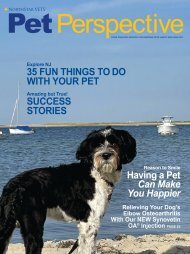2022_09_New_Jersey_Monthly
You also want an ePaper? Increase the reach of your titles
YUMPU automatically turns print PDFs into web optimized ePapers that Google loves.
SPECIAL ADVERTISING SECTION<br />
to ensure a normal set of chromosomes<br />
in the embryo. Finally,<br />
those two elements have enabled<br />
us to perform single-embryo<br />
transfers. Placing one healthy embryo<br />
into the uterus has increased<br />
our success rate to upward of<br />
83 percent for women under 35,<br />
which is one of the highest rates in<br />
this field. Before these tools came<br />
along, that rate was in the 40 to<br />
50 percent range. Also, singleembryo<br />
transfer has reduced the<br />
risk of multiple births, like twins<br />
or triplets.<br />
Q: Are there any other methods<br />
that have impacted fertility<br />
success?<br />
A: Frozen embryo transfers help<br />
increase pregnancy rates. Rather<br />
than transferring a fresh embryo<br />
within a week of egg retrieval,<br />
we can now freeze embryos to<br />
allow for study of genetic testing<br />
results. The frozen transfer is done<br />
a month later, and the extra time<br />
leads to the uterus being more<br />
receptive to the embryo transfer.<br />
Q: Why has RMA been so<br />
successful in this field?<br />
A: We’re following the science,<br />
and the science is saying that<br />
our methods achieve the highest<br />
pregnancy rates without the risk<br />
of multiples, ensuring the safest<br />
environment for parent and baby.<br />
It’s life-changing work—we’re<br />
helping build families, one healthy<br />
baby at a time.<br />
955 South Springfield Avenue<br />
Building A, Suite 103<br />
Springfield, NJ 07081<br />
973-258-4081<br />
rmanetwork.com<br />
SUMMIT<br />
HEARING AID<br />
CENTER<br />
Dr. Leslie E. Herman, audiologist,<br />
founder and director<br />
Q: One of your recent patients<br />
had been adamant about not<br />
using hearing aids, despite<br />
pleas from her children to do<br />
so. How did you help her?<br />
A: Limited interaction with<br />
friends and family during the<br />
pandemic led the patient to believe<br />
her hearing was improving, but in<br />
Leslie E. Herman, AuD, CCC-A<br />
reality it had not. Over dinner last<br />
year, her children finally convinced<br />
her that she needed to see a doctor.<br />
She made an appointment with me<br />
the very next month.<br />
Q: How did you help her?<br />
A: After conducting a thorough<br />
examination, I recommended a<br />
pair of rechargeable hearing aids.<br />
They are simply recharged at night<br />
like an iPhone, and they quickly<br />
became a natural part of her life.<br />
She is very proud of them, and<br />
with her improved hearing she was<br />
able to volunteer at a meaningful<br />
job, which led to a paid position.<br />
Her children were also very happy<br />
she finally got help. The strain in<br />
communication they were experiencing<br />
with someone they loved so<br />
much had gotten very frustrating<br />
and worrisome for all of them. Ultimately,<br />
the patient came to our<br />
facility because her children didn’t<br />
give up. “Now we have our mom<br />
back,” they said.<br />
75 Summit Avenue<br />
Summit, NJ 07901<br />
908-277-6886<br />
summithearingaidcenter.com<br />
ENGLEWOOD<br />
HEALTH<br />
Dr. Kevin Yao, chief of neurosurgery;<br />
Dr. Asit K. Shah, chief of<br />
orthopedic surgery<br />
Q: What’s new in the world of<br />
spine surgery?<br />
A: Dr. Yao: Englewood Health’s<br />
team of orthopedic spine surgeons<br />
and neurosurgeons is at the forefront<br />
of advances in spine surgery.<br />
Recently, we’ve introduced robotassisted<br />
spine surgery that has<br />
GPS-like precision. Our program<br />
is the first in <strong>New</strong> <strong>Jersey</strong> to introduce<br />
this technology, which promises<br />
to take us to the next era of<br />
spine surgery. This technology is<br />
called the Excelsius Ecosystem,<br />
a robotic imaging and navigation<br />
platform that improves accuracy<br />
and efficiency and enables minimally<br />
invasive surgery—translating<br />
into less time in the operating<br />
room, shorter recoveries, and even<br />
more successful outcomes.<br />
Q: How does Excelsius work?<br />
A: Dr. Yao: Spine surgery<br />
requires the accurate placement<br />
of surgical hardware used to hold<br />
the vertebrae. The ExcelsiusGPS®<br />
generates real-time information<br />
102 SEPTEMBER <strong>2022</strong> NJMONTHLY.COM

















